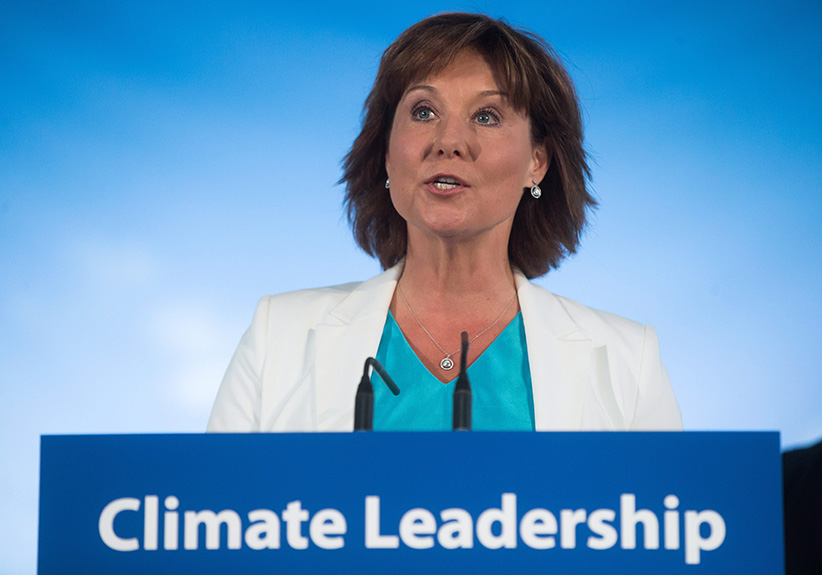Why Christy Clark’s pause on carbon pricing makes sense
Three reasons why Christy Clark needn’t be panned for halting further increases in B.C.’s carbon tax until other provinces catch up
British Columbia Premier Christy Clark speaks about the province’s climate action plan at the still under construction Carbon Capture and Conversion Institute, in Richmond, B.C., on Friday August 19, 2016. (Darryl Dyck/CP)
Share

History reveals that every revolution eventually turns on its own adherents, with varying degrees of violence. Radicals and zealots are never satisfied with anything less than permanent upheaval; anyone who advocates moderation or consensus soon comes to be seen as a traitor to the cause. If we accept that a carbon tax represents a revolution of sorts for Canada, this backlash against reason has already appeared in British Columbia.
B.C. was once the darling of the Canadian environmental movement. In 2008 it led the country—and all of North America—on climate change by instituting a comprehensive tax of $10 per tonne of carbon emissions. This tax was hiked annually until it hit $30/tonne in 2012, precipitating a noticeable decline in provincial emissions without causing dramatic economic hardship. (A $30 tax adds approximately seven cents to a litre of gas.) Environmentalists across the country sang B.C.’s praises and loudly demanded other provinces follow its lead. Those days are over.
Last week, B.C. Premier Christy Clark announced an update to her province’s climate change policy. Plenty of new measures are up for debate in this package, but the main issue is her decision to halt further increases in the provincial carbon tax. In doing so she disregarded an advisory panel’s recommendation that the tax be boosted by $10/tonne every year from 2018 until 2050, when it would hit $350/tonne. (Equivalent to about 80¢ per litre of gas.) With an election in the near future, Clark was clearly concerned about the political and practical ramifications of such a move.
For her caution, Clark received a furious blast from many of the same environmental groups that once lauded her province. “It’s irresponsible and unacceptable that our so-called leaders refuse to act,” groused the B.C.-based Wilderness Committee. Clean Energy Canada claimed “B.C.’s climate leadership has fizzled.” Well-known B.C. academic Mark Jaccard labelled Clark’s decision a “cynically ineffective” policy that is “taking cynicism to a new level.”
From the angry tone of her critics, you might think Clark had pulled B.C. off its perch as Canada’s climate change policy leader. Not so. B.C. still has the highest carbon tax in the country. Alberta won’t match B.C.’s $30/tonne carbon price until 2018. Quebec currently operates, and Ontario plans to join, a cap-and-trade system that prices carbon emissions at about $16/tonne. Manitoba, Saskatchewan and the Atlantic provinces have no specific policies or prices. “We will consider raising the carbon tax as other provinces catch up,” Clark said, quite appropriately. And yet Canada’s reigning carbon tax champion is being treated by environmentalists as a counter-revolutionary. Only the show trial remains.
A few important public policy lessons fall out of B.C.’s recent experience. First, there is clearly no benefit to being a first mover on climate change. For all its accomplishments over the past eight years, the B.C. government is now condemned for allowing the rest of the country to equal its achievements. If soaking up praise from the environmental lobby is a goal, it seems better to be a follower rather than a leader—which explains why Ontario and Alberta are the new favourites among the notoriously fickle green crowd.
Second, the fury directed at Clark suggests most environmental groups are clueless about the political context of climate change. While B.C.’s $30/tonne carbon tax has had a significant impact on a few industries exposed to foreign competition, such as cement and agriculture, the fact the broader economy has not been brought to a standstill doesn’t mean the same will be true at $350/tonne. The province’s own budgetary analysis concludes that “increasing the carbon tax beyond the current $30 per tonne would have a stronger negative effect on economic growth.” No successful politician can ignore the economic implications of their actions, or the electorate’s ability to accept change. Carbon emission targets must always be balanced against other public policy obligations.
Finally, the demand that B.C. ratchet its carbon price far beyond other provinces’ efforts misses the bigger picture. The objective of a coherent national climate change policy should be a single, consistent price across the entire country. Massive differences in tax rates or cap-and-trade fees between provinces will create substantial economic damage by encouraging businesses and consumers to move around the country to take advantage of these variances. Widening the gap between B.C. and the rest of Canada is thus counter-productive to the interests of a national carbon plan. And with a federal-provincial conference on climate change coming this fall, it makes ample sense for B.C. to wait to see if Ottawa sets a floor price on carbon across the country, and at what level. Provincial convergence, not divergence, is the appropriate goal.
Having achieved what was once thought impossible in Canada—broad acceptance of carbon pricing—the revolutionaries of the environmental movement must learn to give credit where it’s due, and focus their attention on encouraging the laggards rather than attacking the leaders.